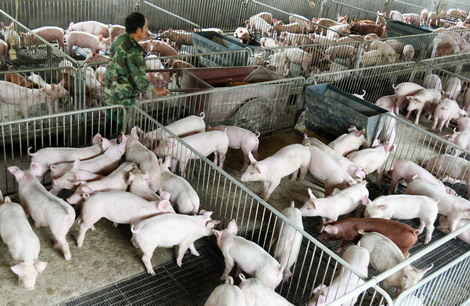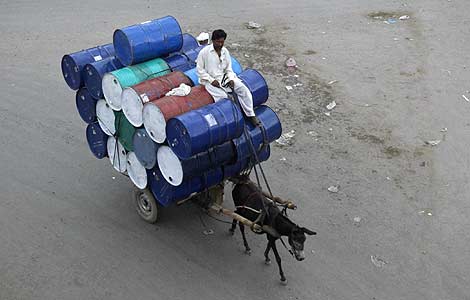Pig farmers hope to breed success
Updated: 2011-08-22 09:57
By Yang Wanli and Shi Baoyin (China Daily)
|
|||||||||||
|
 |
|
Even a family pig farm can bring a lot of hogs to market, like this one in Fengqiao village, Zhuji, Zhejiang province. But smaller operations are closing because of unstable prices and havoc caused by disease. [Photo / China Daily] |
Fewer family raisers
China, the world's largest pork consumer, also is the largest producer, with about 50 million tons of meat each year to feed its 1.3 billion people and 55 percent of global production. However, production is increasingly concentrated.
Through the mid-1990s, more than 90 percent of the country's pig breeders were those small family farms, each producing 40 to 50 hogs a year. Then farmers began to reduce their risk by cooperating with big companies.
In neighboring Hunan province, the number of breeders with fewer than 50 pigs dropped 30 percent in recent years, Zhou Xiaorong, president of the Hunan Meat Association, told Xinhua News Agency in July. In East China's Shandong province, an estimated 90 percent of breeders raise at least 50 pigs, according to the Shandong Hog Raising and Selling Association.
The Ministry of Agriculture said that in 2007, half of China's hogs were produced by 2.2 million breeders raising more than 50 hogs at a time. The next year, those breeders provided 62 percent of the hogs.
Better option
About half an hour's drive from downtown Zhengzhou, 35-year-old Zhou Hui is taking care of 40 pregnant hogs. She and her husband live in a small white house that connects two hog barns. The couple are not family breeders, but work for a large-scale company, Chuying.
The company, based in Henan, sold about 660,000 hogs last year. It developed a "staging" breed mode that has attracted thousands of participating farmers.
Chuying divided the traditional raising process into four stages - pregnancy, delivery, care of baby pigs, and raising them to market size. The farmers are guided by trained technicians and are involved in just a single process, which can prevent the spread of disease.
To get into Chuying's No 1 Breeding Base, a car passes twice through sanitation showers about 300 meters away. Technician Liu Qingfeng said visitors cannot enter unless two days have elapsed since they visited another farm, and they must wear protective clothing.
"Pigs are easily susceptible to illness," he said. "For safety's sake, even the breeders do not go out of the base before they finish a single breeding process."
Liu said family pig farmers lose 17 to 20 percent of their pigs to illness, but the rate in Chuying's system is 5 to 6 percent.
The No 1 Breeding Base covers 133 hectares and has more than 400 barns, each holding about 40 pigs. The young ones arrive weighing 25 to 30 kg and will reach 100 to 160 kg over three months.
Chuying has 80 other breeding bases in the province, each with a single stage. The workers, who are independent contractors, are paid according to how much work is required, not the specific job or stage they are involved in. The stages vary in length, from about 40 days to 90.
Breeders take 10 to 15 days off after finishing a stage, and the work provides steady income without the fears associated with unstable meat prices.
Zhou and her husband earned 120,000 yuan last year, taking in twice the number of hogs than most people. "This job is easy and gives me more freedom," Zhou said. "At least we don't need to punch a time card, like white-collar workers."
Zhou and her husband started to work with Chuying in 2003. Last year they bought a two-floor apartment in Xinzheng, a 10-minute drive from the farm.
"Our life doesn't sound like a traditional hog breeding family, right? Group working gives us confidence and safety that we could hardly imagine before," Zhou said.













